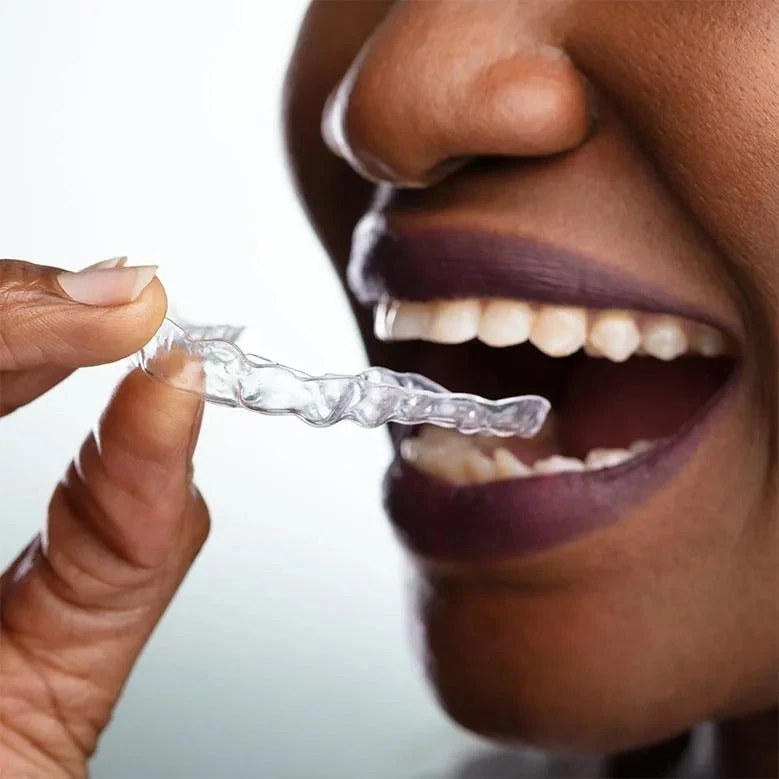Tooth enamel is a hard, semi-clear outer layer that safeguards your teeth from daily wear and tears, ensuring you don’t feel temperature extremes from hot and cold food/drinks. Enamel also fends off chemicals and acids that can damage your teeth.
Whenever you eat/drink anything acidic, your teeth’s enamel becomes softer for a short time, losing some of its mineral content. Your saliva will slowly cancel out this acidity in your mouth and return it to its natural balance. However, if this acid attack happens too frequently, your mouth doesn’t have an opportunity to repair itself, allowing tiny bits of enamel to brush away. Over time, you’ll start losing your teeth’s surface.
The erosion of this shell can increase the likelihood of teeth decay and cavities. You’ll start reacting more to hot and cold foods/drinks as they can get into the holes in your enamel and reach the nerves inside.
As a leading provider of night guards for teeth grinding, we discuss how you can protect your teeth’s enamel:
What causes enamel erosion?
Your teeth’s outer layer can be damaged as a result of the following:
Grinding your teeth (also known as bruxism) — too much of it may lead to enamel damage.Brushing too hard. So, use a soft brush with a gentle touch.Supplements/drugs that have a lot of acids. For example, vitamin C or aspirin.Binge drinking, alcoholism, or bulimia. People with these conditions vomit frequently, which can damage their teeth.Heartburn, GERD, or acid reflux disease. These bring stomach acids up to the mouth, which can be harmful to the enamel.Dry mouth. Saliva washes away leftover food and bacteria acids in your mouth, preventing tooth decay.How to protect your teeth’s enamel?
Get regular checkupsSee your dentist every 6 months for cleaning and checkup to keep your teeth strong. They may spot signs of trouble, like tooth grinding or cavities, before they do a lot of damage.
Your dentist will also ensure you get the right amount of fluoride to safeguard and harden enamel. If your water isn’t fluoridated, ask them if you need coatings, mouthwash, or fluoride supplements for your teeth.
Don’t grind your teethSome people grind their teeth, especially at night. Unfortunately, it can wear down the enamel.
If you have this habit, get in touch with your dentist. They will suggest a custom-fitted mouth guard that can safeguard your teeth.
Don’t let your mouth drySaliva helps wash away bacteria and food that can cause cavities. In addition, it fights the effects of acidic foods. Drink water frequently to keep your mouth moist and clean.
If you do an intense workout, don’t forget to rehydrate during and after your session. Sucking on sugarless hard candy and chewing sugarless gum may also help keep saliva flowing in your mouth.
Some medications and medical conditions can lead to dry mouth. Reach out to your dentist for possible treatments.
Beware of chlorinated poolsThe water can become too acidic when pools aren’t chlorinated the way they should be. In such cases, the water can be harmful to teeth.
See if the gym/recreation center where you swim is monitoring the pool’s chlorine levels constantly.
Also, don’t swim with your mouth open.
Treat eating disorders and heartburnIf you have severe heartburn, stomach acids may eventually escape and reach your mouth, leading to enamel erosion.
Another threat to your enamel is the eating disorder bulimia, where people vomit food after they eat.
If you have conditions like these, get in touch with your doctor about treatment.
Use fluorideAccording to ADA (the American Dental Association), fluoride is nature’s cavity fighter because it helps repair the early stages of tooth decay and strengthens your enamel. Fluoride also makes your teeth more resistant to acids that come from bacteria and foods in your mouth.
You should use fluoride toothpaste throughout your life. Rinse with a mouthwash that has fluoride to keep your enamel strong and prevent cavities.
Don’t overbrushYou can wear down your enamel if you brush too hard and fast. Hold a brush with a soft bristle at an angle of 45 degrees to your gums. Subsequently, moving it back and forth in gentle, short strokes (around the distance of one tooth).
Don’t brush your teeth immediately after eating citrus fruits or sweets — wait for an hour at least. Acidic foods soften enamel, making it easier for you to damage it.
Eat foods that safeguard enamelCalcium in food counters acids in your mouth that leads to decay, helping you keep your teeth and bones strong.
Cheese, milk, as well as other dairy products help strengthen and safeguard enamel. Choose fat-free or low-fat items to help keep calories down.
If you don’t like eating dairy products, look for calcium-rich foods.
Limit sugary foods/drinksBacteria within your mouth feed on sugar from foods/drinks. Subsequently, they produce acids, which wear away and soften your enamel. Candies that stick to your teeth may also lead to damage. In addition, soft drinks can have extra acids.
While soft drinks comprising artificial sweeteners are a better choice than ones containing sugar, they’re acidic and wear the enamel down over time.
A glass of plain water is the best choice when you’re thirsty because most flavored waters are acidic.
Order a night guard onlinefrom Clear Comfort Night Guards and wear them before you sleepClear Comfort Night Guards offer custom-made night guards made by highly trained dental technicians to suit the varying needs of their customers. Their night guards help with teeth grinding.
So, shop night teeth guards and start prioritizing your oral health; their night guards also protect your crowns, veneers, and dental works.
Visit their website now for more information!
About the Author
Debbie J. Summers is a medical professional with a degree in dental hygiene. While she’s currently associated with a healthcare company, she also loves writing blogs to help her audience stay on top of their oral health.


